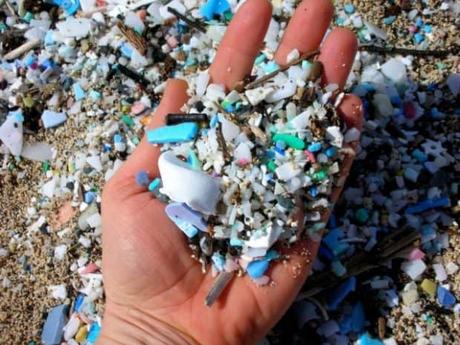A dying tiny loggerhead turtle that had been washed up in Boca Raton, Florida, had 104 pieces of plastic in its stomach and soon died of starvation.
According to the experts, it was not just one. Dozens of young turtles have starved to death this year in that area after eating microplastics in the sea.

The turtle that was small enough to fit in the palm of a hand was weak and emaciated as Emily Mirowski, a turtle rehabilitation assistant, told CNN. It wasn’t healthy. It was almost lifeless, lethargic, with a drooping head, whereas healthy turtles are usually fully energetic and are hard to hold.
Mirowski was shocked to find 104 pieces of plastic inside it, in the process of determining the cause of death.
“As she cut into it, it was just like, whoa. Every time she cut through there was more plastic coming out of its stomach,” said Whitney Crowder, 39, who runs the rehabilitation center where the turtle was washed up.
A photograph of the loggerhead sea turtle and the plastic fragments found in its stomach was posted on Facebook on Tuesday by the Gumbo Limbo Nature Centre after it died. Since then, the post has been shared thousands of times. However, while the public was shocked, it is something that Crowder sees every day.
“It’s washback season at Gumbo Limbo and weak, tiny turtles are washing up along the coastline needing our help… 100% of our washbacks that didn’t make it had plastic in their intestinal tracts,” read the post.
“It was really heartbreaking. But it’s something we’ve seen for several years and we’re just glad people are finally seeing this image, and hopefully it’s raising awareness,” Emily said.
Every year between March and October, when babies hatch, they head towards sargassum, the floating seaweed, and they live there for their first few years. As trash accumulates on the weed-line, baby turtles end up eating it.
Plastics block up their systems, and some even get their stomachs punctured by it.
“The issue is that with all the plastic in the oceans, that’s where the plastic sticks,” Ms Mirowski said. “All the microplastics stick to the seaweed, and it looks like food to the baby turtles.”
As the turtles feel full of the plastic in their stomachs, they don’t eat anything and lack the nutrition they need for survival.
This season, dozens of babies that have washed back ashore just after a few weeks have been dropped off by the members of the public at the center, and all had plastic in their stomachs, CNN reported.
The suffering from malnutrition due to consumption of plastic is so common in the turtles that the nature center, in Boca Raton, put a box outside its building for residents to drop-off sickly turtles safely for rehabilitation. The three staff members who work at the clinic carry a 24-hour-emergency line wherever they go, and they are handed over thousands of washbacks during some seasons. Crowder calls it an epidemic.
The staffs at Gumbo Limbo try to bring them back to full health. They feed the turtles with a diuretic that helps them to flush plastic out of their system.
Few survive, but most of them are too weak and emaciated. If survived, turtles are driven out to the Gulf Stream and let back into the sea.
“Just this morning, we have 60 washback turtles sitting in our hatchling tank. Six have died already,” Crowder says.
“We give them a small amount of fluids every day to get them hydrated,” Ms Mirowski said. “Then we hope they’ll pass the plastic naturally. The important thing is getting them hydrated to get their appetite back.”
Unless and until people stop buying plastics and disposing of them improperly, the problem won’t end, she said.
“We have to reduce plastic use as much as possible,” she said.
“Not just recycling, but eliminating plastic out of daily use. Every piece of plastic that’s ever been made is still out there. It never goes away, it just breaks down to smaller pieces.”
Crowder is unequivocal when asked what people can do:
“People need to eliminate single-use plastics from their lifestyle. This problem is much bigger than just individual change, but that’s where you can start.”

